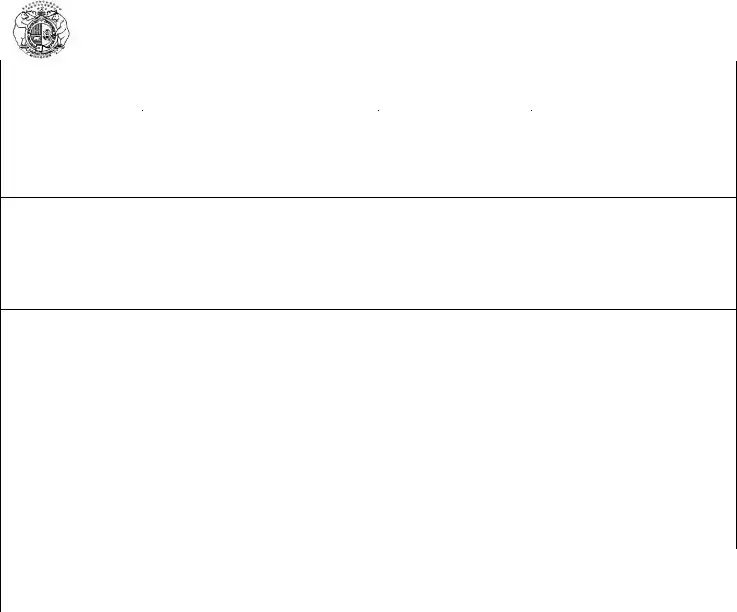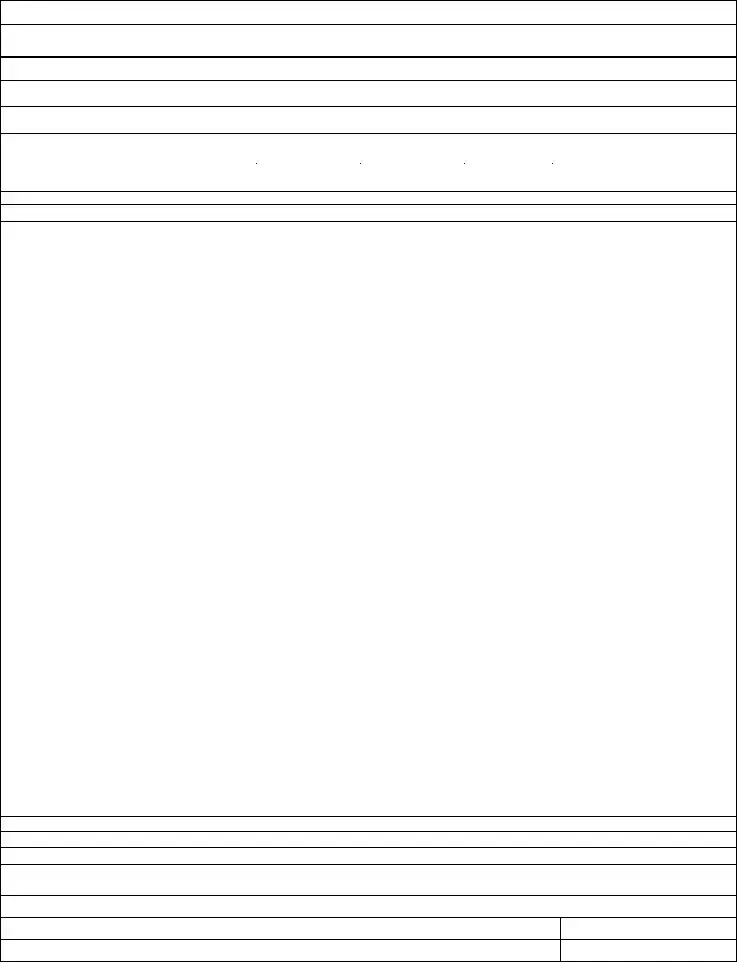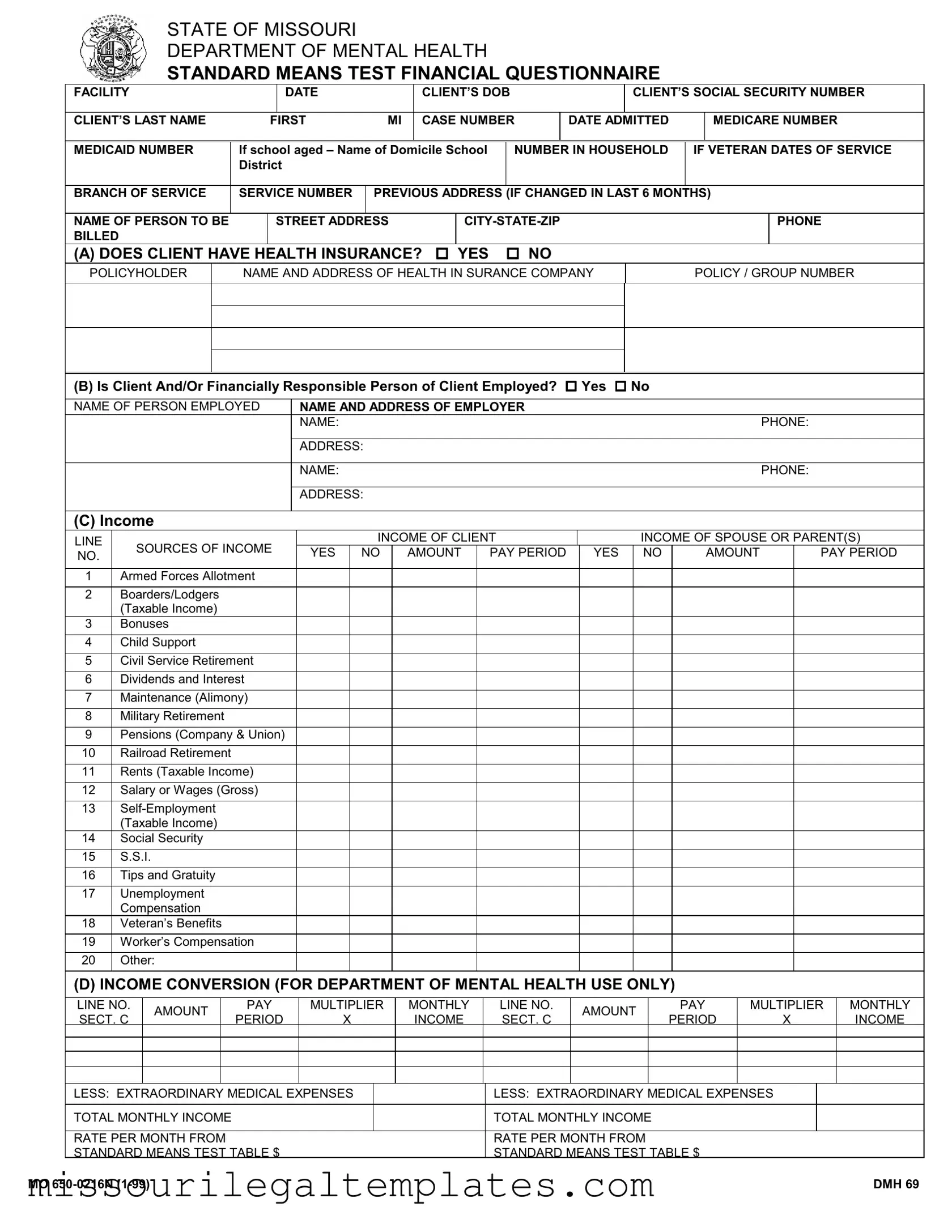Fill in a Valid Dmh 69 Missouri Template
The DMH 69 form is a crucial document utilized in the state of Missouri, specifically within the Department of Mental Health. This form serves multiple purposes, primarily focusing on the assessment and documentation of mental health services provided to individuals. It encompasses essential information that facilitates the effective delivery of care and ensures compliance with state regulations. The form includes sections for personal details, service descriptions, and necessary signatures, all of which contribute to a comprehensive record of the individual's treatment. Proper completion of the DMH 69 form is vital for maintaining accurate health records and supporting the continuity of care. Additionally, it plays a significant role in the funding and reimbursement processes for mental health services, making it an important tool for both providers and clients. Understanding the components and requirements of this form is essential for anyone involved in mental health care in Missouri.
Dmh 69 Missouri Preview

|
|
|
|
|
|
|
|
|
|
||||||||
|
|
|
|
|
|
|
|
|
|
|
|||||||
|
|
|
|||||||||||||||
|
|
|
|||||||||||||||
|
|
|
|
|
|
|
|
||||||||||
|
|
|
|
|
|
|
|
|
|
|
|||||||
|
|
||||||||||||||||
|
|
|
|
|
|
|
|
|
|||||||||
|
|
|
## |
$$ |
|||||||||||||
|
|
|
|
!" ! |
|
|
|
|
|
|
|
|
|
|
|||
#$ |
|
$ |
%$&#'(#) |
||||||||||||||
|
|
|
|
|
|
|
|
|
|
|
|
|
|||||
% |
|
|
**+% |
|
|
|
|
%# |
|||||||||
|
|
|
|
|
|
|
|
|
|
|
|
|
|
|
|
|
|
&)#$##, |
|
|
|
|
|
||||||||||||
|
|
||||||||||||||||
|
|
|
|
|
|
|
|
|
|
|
|
|
|
|
|
|
|
|
|
|
|
|
|
|
|
|
|
|
|
|
|
||||
|
|
|
|
|
|
|
|
|
|
|
|
|
|
|
|||
|
|
|
|
|
|
|
|
|
|
|
|
|
|
||||
|
|
|
|
|
|
|
|
|
|
|
|
|
|
|
|
||
&)
% |
|
|
|
|
|
|
|
|
|
|
|
|
|
|
|
|
|
|
|
|
|
||||||||||||||||||||||
|
|
|
|
|
|
|
|
|
|||||||||||||||||||
|
|
|
|
|
|
|
|
|
|
|
|
|
|
||||||||||||||
|
|
|
|
|
|
|
|
|
|
|
|
|
|
|
|
|
|
|
|
|
|
|
|
|
|
|
|
|
|
|
|
|
|
|
|
|
|
|
|
|
|
|
|
|
|
|
|
|
|
|
|
|
|||
!""#$# |
|
|
|
|
|
|
|
|
|
||||||||||||||||||
% |
&!'! |
|
|
|
|
|
|
|
|
|
|
||||||||||||||||
|
&(&)"$ |
|
|
|
|
|
|
|
|
|
|
|
|
|
|
|
|
|
|
|
|
|
|
||||
* |
$+!! |
|
|
|
|
|
|
|
|
|
|
|
|
||||||||||||||
, |
|
|
|
|
|
|
|
|
|
|
|||||||||||||||||
0 |
.1."1. #.$# |
|
|
|
|
|
|
|
|
|
|||||||||||||||||
2 |
.1.$!&$$#!# |
|
|
|
|
|
|
|
|
|
|||||||||||||||||
3 |
&.$#$&$ ".$4 |
|
|
|
|
|
|
|
|
|
|||||||||||||||||
5 |
.".#&4#.$# |
|
|
|
|
|
|
|
|
|
|
||||||||||||||||
6 |
$!.$!/&$47$.$ |
|
|
|
|
|
|
|
|
|
|||||||||||||||||
8 |
&."&#.$# |
|
|
|
|
|
|
|
|
|
|
||||||||||||||||
$#!&(&)"$ |
|
|
|
|
|
|
|
|
|
||||||||||||||||||
% |
&"&49&'!!! |
|
|
|
|
|
|
|
|
|
|||||||||||||||||
* |
":;/"4$# |
|
|
|
|
|
|
|
|
|
|
||||||||||||||||
|
&(&)"$ |
|
|
|
|
|
|
|
|
|
|
|
|
|
|
|
|
|
|
|
|
|
|
||||
, |
.&" |
+.#4 |
|
|
|
|
|
|
|
|
|
|
|||||||||||||||
0 |
|
|
|
|
|
|
|
|
|
|
|
|
|||||||||||||||
2 |
./!&$+.#4 |
|
|
|
|
|
|
|
|
|
|
||||||||||||||||
3 |
$/"4$# |
|
|
|
|
|
|
|
|
|
|
||||||||||||||||
|
/$!.$ |
|
|
|
|
|
|
|
|
|
|
|
|
|
|
|
|
|
|
|
|
|
|
||||
5 |
<#&$=!$:.#! |
|
|
|
|
|
|
|
|
|
|
||||||||||||||||
6 |
9>=!/$!.$ |
|
|
|
|
|
|
|
|
|
|||||||||||||||||
%8 |
|
|
|
|
|
|
|
|
|
|
|
|
|||||||||||||||
&)$&%##) |
|
|
|
|
|||||||||||||||||||||||
|
|
|
|
|
|
|
|
|
|
|
|
|
|
|
|
|
|
|
|
|
|
|
|||||
|
|
|
|
|
|
|
|
|
|||||||||||||||||||
|
|
? |
|
|
|
|
|
|
|
|
? |
|
|
||||||||||||||
|
|
|
|
|
|
|
|
|
|
|
|
|
|
|
|
||||||||||||
|
|
|
|
|
|
|
|
|
|
|
|
|
|
|
|
||||||||||||
|
|
|
|
|
|
|
|
|
|
|
|
|
|
|
|
||||||||||||
|
|
|
|
|
|
|
|
|
|
|
|
|
|
|
|
||||||||||||
|
|
|
|
|
|
|
|
|
|
|
|
|
|
|
|
||||||||||||
?? |
|
|
|
|
|
|
?? |
|
|||||||||||||||||||
|
|
|
|
|
|
|
|
|
|
|
|
|
|
|
|
|
|||||||||||
|
|
|
|
|
|
|
|
|
|
|
|
|
|||||||||||||||
|
|
|
|
|
|
|
|
|
|
|
|
|
|
|
|
|
|
||||||||||
|
|
|
|
|
|
|
|
|
|
|
|
|
|
|
|
||||||||||||
@ |
|
|
|
|
|
|
|
|
|
@ |
|
|
|
|
|||||||||||||
(23*345(&5*66)#(6

&)###$'$#'#&)#,
&)$'$#7,
8!"!"8
&')%%9%%
|
#% |
|
# |
$ |
||||
:: |
|
|
# |
|||||
|
|
|
||||||
|
|
|||||||
|
|
|||||||
)
% |
=# |
$ |
|||
; |
|||||
? |
|||||
">; |
|||||
"'" |
|||||
|
|
|
|
|
|
" <!? |
|||||
" |
|||||
1 # |
|||||
"!@!; |
|||||
!@!; |
|||||
|
|||||
< |
|||||
!? |
|||||
"! ! |
|||||
!"8 |
&)
% |
=##, |
=###'', |
|
||||||
%% |
|
$ |
|
=, |
|||||
|
|
|
|
|
|
|
|||
|
|
|
|
|
|||||
|
|
|
|
|
|||||
A)#$.%%%, |
|
|
|||||||
|
|
|
|
|
|
|
|
|
|
|
|
|
|
|
|
|
|
9 |
|
|
|
< |
|
||||||
|
|
|
|||||||
|
|
|
|
|
|
|
|
E |
|
|
|
|
|
|
|
|
|
|
|
|
|
+.&" |
|
||||||
|
|
.: |
|
||||||
|
|
|
|||||||
&7)7
&)
.'$+
.'$+:$#1.A
(23*345(&5*66)#(6
Common PDF Templates
Missouri Tax Forms - Dependent information must be provided and counted from the federal tax return.
Can You Claim Abandoned Houses - This form supports local law enforcement's efforts to manage abandoned vehicles effectively.
In addition to the standard Bill of Lading, utilizing a Bill of Lading with a Supplement form can greatly enhance the clarity and completeness of shipping transactions. This form allows for additional notes and specifications, ensuring that all details are meticulously documented. For more templates and examples, you can visit TopTemplates.info.
Judgment of Possession Form - The signed form may necessitate follow-up actions with the court or revenue department.
Dos and Don'ts
When filling out the DMH 69 Missouri form, it is important to follow certain guidelines to ensure accuracy and compliance. Below is a list of things you should and should not do.
- Do read the instructions carefully before starting the form.
- Do use black or blue ink to fill out the form.
- Do provide accurate and complete information.
- Do double-check all entries for spelling and numerical errors.
- Do sign and date the form where required.
- Don't leave any required fields blank.
- Don't use correction fluid or tape on the form.
- Don't submit the form without a thorough review.
- Don't provide personal information that is not requested.
- Don't forget to keep a copy of the completed form for your records.
Key takeaways
When filling out and using the DMH 69 Missouri form, consider the following key takeaways:
- Understand the Purpose: The DMH 69 form is designed for specific mental health documentation. Ensure you know its intended use before proceeding.
- Gather Necessary Information: Collect all relevant personal and medical information before starting the form. This will streamline the process.
- Follow Instructions Carefully: Adhere to the guidelines provided with the form. Each section has specific requirements that must be met.
- Be Accurate and Honest: Fill out the form truthfully. Inaccurate information can lead to complications in processing.
- Review Before Submission: Double-check all entries for completeness and accuracy. A thorough review can prevent delays.
- Keep Copies: Always make copies of the completed form for your records. This is essential for future reference.
- Consult Professionals if Needed: If unsure about any part of the form, seek assistance from a qualified professional. Their guidance can be invaluable.
Misconceptions
The DMH 69 form in Missouri is often misunderstood. Here are ten common misconceptions about it:
- It's only for mental health professionals. Many believe that only licensed professionals can use the DMH 69 form. In reality, it can be completed by individuals seeking services or support.
- Filling out the form guarantees services. Some think that submitting the DMH 69 automatically secures mental health services. However, eligibility and availability depend on various factors.
- The form is too complex for the average person. While it may seem daunting, the DMH 69 is designed to be user-friendly. Most people can fill it out with a little guidance.
- It's only for severe mental health issues. A common belief is that the DMH 69 is only for those with serious conditions. In fact, it can be used for a wide range of mental health concerns.
- Once submitted, it cannot be changed. Many worry that they cannot make changes after submitting the form. However, individuals can update their information if necessary.
- It must be submitted in person. Some think they must hand in the DMH 69 form at a specific location. In many cases, it can be submitted online or via mail.
- There is a fee to submit the form. Some individuals believe there is a cost associated with the DMH 69. In most cases, there are no fees for submitting this form.
- Confidentiality is not maintained. A misconception is that personal information on the DMH 69 is not kept private. In fact, strict confidentiality rules protect the information provided.
- It is only for residents of Missouri. While the DMH 69 is a Missouri form, individuals from other states can sometimes use it if they are seeking services in Missouri.
- The form is not necessary if I already have a therapist. Some believe that if they have an existing therapist, they do not need to fill out the DMH 69. However, it may still be required for certain services or funding.
Understanding these misconceptions can help individuals navigate the process more effectively and access the mental health services they need.
Similar forms
- DMH 70 Form: This document is used for similar purposes as the DMH 69, focusing on mental health assessments and treatment plans. Both forms require detailed information about the patient's mental health history.
- DMH 71 Form: Like the DMH 69, the DMH 71 is involved in the evaluation process for individuals seeking mental health services. It emphasizes consent and the sharing of information among healthcare providers.
- DMH 72 Form: This form is used to track progress in treatment, similar to the DMH 69. It includes sections for updates on the patient's condition and treatment adjustments.
- DMH 73 Form: The DMH 73 is a discharge summary that parallels the DMH 69 in documenting the patient's treatment journey. It highlights outcomes and recommendations for ongoing care.
- Firearm Bill of Sale Form: For responsible firearm transactions, ensure you utilize the accurate Florida firearm bill of sale documentation to protect both buyer and seller in the ownership transfer process.
- DMH 74 Form: This document serves as a referral form for mental health services. It shares similarities with the DMH 69 in that both require comprehensive patient information to facilitate care.
- DMH 75 Form: The DMH 75 is used for crisis intervention and assessment. It resembles the DMH 69 in its focus on immediate mental health needs and interventions.
- DMH 76 Form: This form is utilized for medication management, akin to the DMH 69. It documents medication history and current prescriptions, ensuring continuity of care.
- DMH 77 Form: Similar to the DMH 69, the DMH 77 is a consent form for sharing mental health information among providers, ensuring that patient privacy is maintained while facilitating care.
